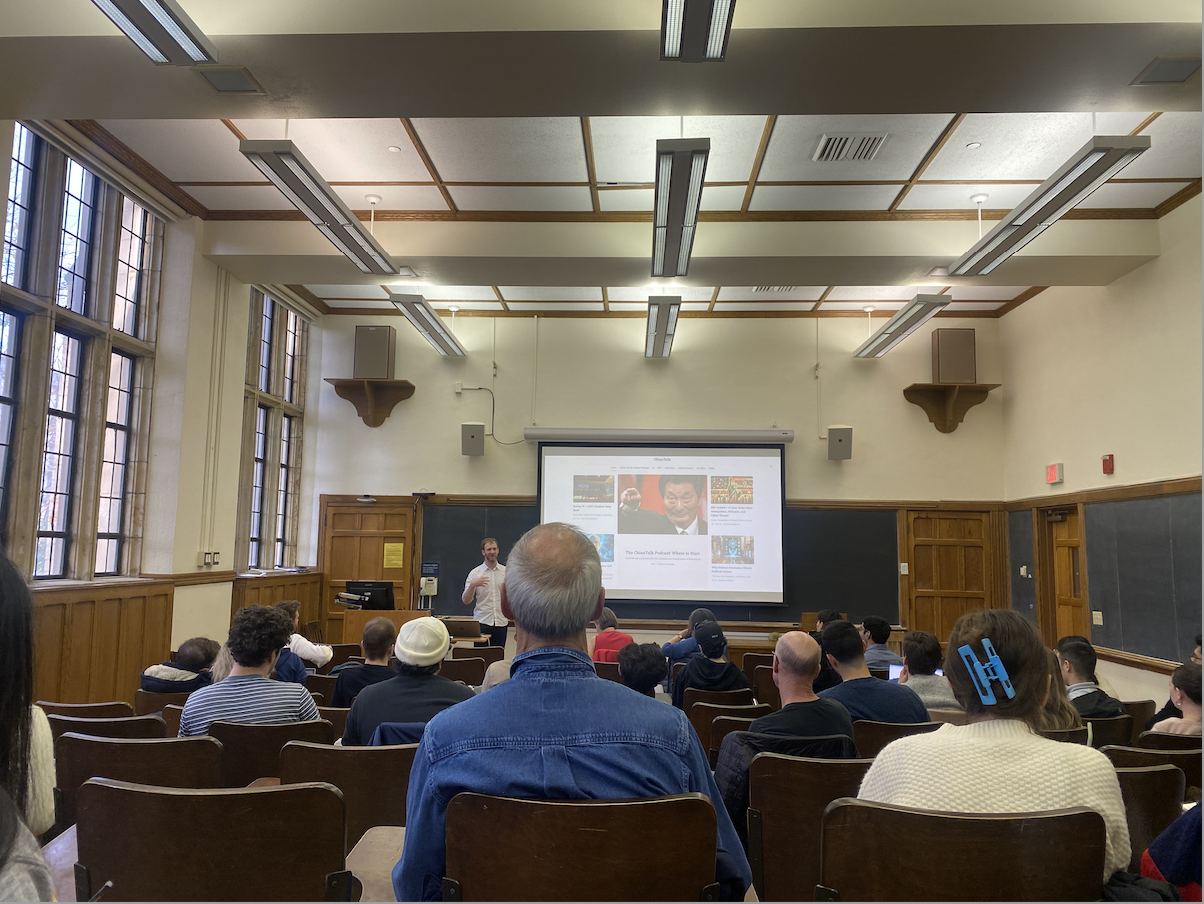Founder of ChinaTalk Jordan Schneider ’13 discusses journalism, independent media
On Nov. 27, Jordan Schneider delivered a talk entitled “Carving a Career in Independent Media: ChinaTalk + AI as a Case Study.”

Emily Aikens, Contributing Photographer
Students jumped back into academics after Thanksgiving break by attending a talk by Jordan Schneider ’13 talk on independent media coverage in China.
Schneider is the founder of ChinaTalk, a newsletter and podcast that covers China, technology and U.S.-China relations. In his presentation, Schneider discussed his career path, the challenges of covering China and how to source stories under heavy governmental censorship.
“The way I fit into the broader ecosystem of thinktankers and daily journalists is trying to spotlight and interrogate the best and most thoughtful writing around China’s emerging technology,” Schneider said during his introduction.
Although he told listeners that he had not taken many Chinese history classes at Yale, he moved to China in 2017 to pursue graduate studies and work at Kuaishou, a global social media platform. There, he explored his interest in the Chinese social, political and economic landscape. He also developed ChinaTalk, which is now his full-time career.
Schneider emphasized that much of his career satisfaction comes from the fact that he works for himself.
“The best part about working for myself is that I literally only read what I’m interested in,” he said. “I generally do my best writing when it’s about things that I’m psyched about.”
Despite professing love for his work, he was not shy about acknowledging the difficulties of pursuing a career in independent journalism.
Schneider said that before he was able to work full-time as a journalist, he made his living as a research analyst at Bridgewater.
“My take on the best way to write for a living in the 2020s on tech in China is to not write for a living. ChinaTalk took me seven years before I could spend all my time on it,” he told the audience.
Not only must China-focused journalists navigate the “brutal field” of journalism, Schneider said, but they also face additional challenges given the country’s censorship laws. Scheider told the audience that media coverage in China has drastically changed since the adoption of the country’s 2017 Constitution, which restricted press freedom.
Because of these changes, he added, it has become increasingly difficult for journalists to get firsthand accounts of daily life in China.
“One of the things that has been really depressing over the past three or four years is that it is basically impossible for mainlanders who live in China to come on the show,” Schneider noted on the organization’s podcast. “In 2017 or 2018, I could still have a conversation about trade policy with Chinese academics.”
While acknowledging the challenges of a career in China-focused journalism, Schneider also encouraged aspiring journalists in the audience to write about topics that interest them.
During the Q&A part of his talk, Schneider emphasized the importance of taking advantage of 21st-century resources to launch one’s journalistic career, both at Yale and beyond.
“Just talk to as many people as you can,” he stated. “It’s great that you have so many speakers who come to campus, but it’s 2023 and you have the internet, which means you can cold email anyone. Find some excuse beyond ‘I want to pick your brain about your career,’ and send them an email.”
Another area that Schneider covered was the use of AI in journalism.
When asked to what extent he uses AI in his work, Schneider answered that it is a helpful tool but that it cannot do everything.
“ChatGPT’s data analysis is incredible. I do a lot more different types of analysis than I would otherwise thanks to AI,” he said. Still, he qualified his support for AI by stating that “ChatGPT won’t make all the connections for you, or it might, and it might be wrong. You really need to check and verify.”
Schneider’s talk was hosted by the Poynter Fellowship in Journalism, a program that regularly brings leading journalists, editors, publishers and other media professionals to campus.
Although the talk attracted a wide variety of professors, students and community members, the largest group represented was students from professor Valerie Hansen’s class, “China from Present to Past.”
According to Lasse Van den Berg ’26, attending Schneider’s lecture was a requirement for Professor Hansen’s course.
“What struck me is the extent to which contemporary debates about Chinese language, foreign policy, journalism and the economy all tie to AI,” Van den Berg told the News. “AI seems to be at the forefront of cultural and political discourse in and about China.”
Hansen told the News that she requires students to attend a guest lecture each year, after the November recess.
As her class prepares their final projects, which involve researching either a political protest or a territorial dispute in China, Hansen hopes that Schneider’s talk will give students a different perspective on the material they have been learning all semester.
“I always want to give them a different perspective from what we have covered in the class, and we have not covered AI,” Hansen told the News.
After the talk, Schneider stayed to talk one-on-one with curious students and professors.
The next Poynter Fellowship event, which will feature Fox News contributor and political consultant Jessica Tarlov, will be held on Wednesday, Nov. 29.







